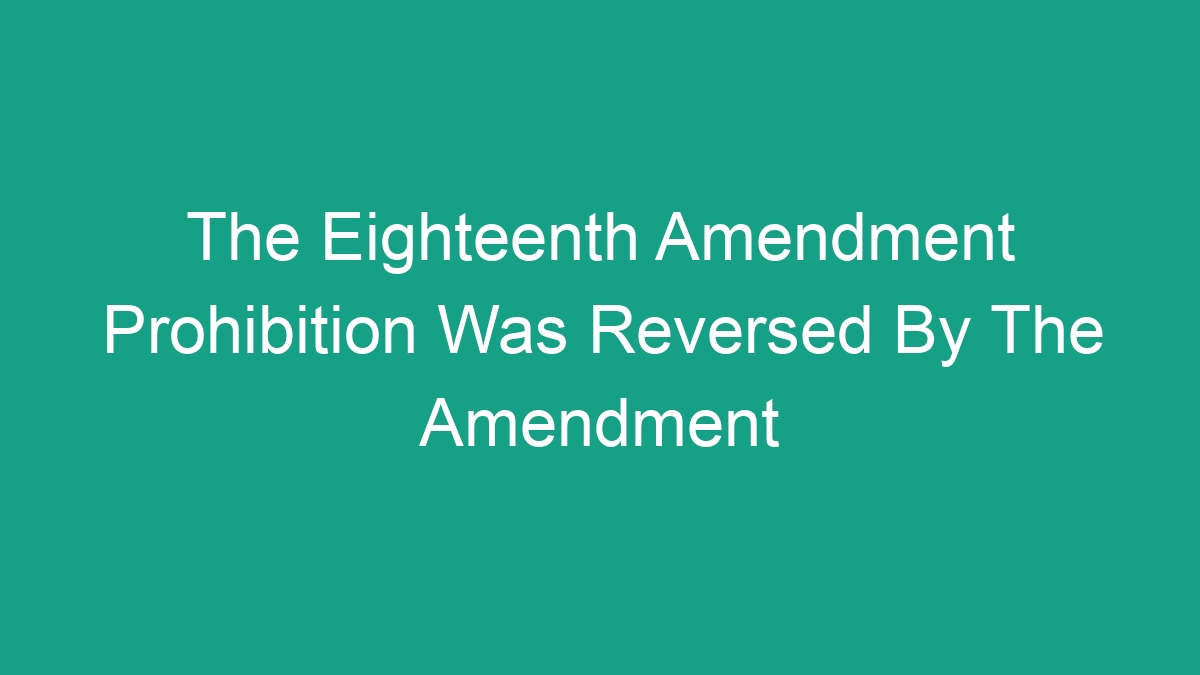
Introduction
The Eighteenth Amendment to the United States Constitution, also known as the Prohibition Amendment, was ratified on January 16, 1919, and went into effect on January 17, 1920. This amendment prohibited the manufacture, sale, and transportation of alcoholic beverages in the United States. However, this period in American history was short-lived, and the Eighteenth Amendment was eventually reversed by the Twenty-First Amendment, which was ratified on December 5, 1933. This article will explore the history, impact, and eventual repeal of the Eighteenth Amendment, shedding light on one of the most transformative eras in American social and legal history.
History of Prohibition
The temperance movement, which aimed to curb alcohol consumption, had been active in the United States since the early 19th century. The movement gained significant traction during the late 19th and early 20th centuries, with proponents arguing that alcohol was a major cause of social issues such as domestic violence, poverty, and crime. Organizations such as the Anti-Saloon League and the Women’s Christian Temperance Union lobbied for nationwide prohibition of alcohol.
In 1917, with the backing of the temperance movement, Congress passed the Eighteenth Amendment, which prohibited the manufacture, sale, or transportation of intoxicating liquors within the United States and its territories. The amendment was then sent to the individual states for ratification. On January 16, 1919, the requisite three-fourths of the states had ratified the amendment, and it was officially added to the Constitution.
Impact of Prohibition
The implementation of the Eighteenth Amendment had significant social, economic, and legal ramifications. On a social level, Prohibition led to a sharp decline in alcohol consumption, as well as the rise of illegal establishments known as speakeasies, where alcohol could be obtained surreptitiously. The ban also gave rise to organized crime, as criminal syndicates took advantage of the lucrative black market for alcohol.
Economically, Prohibition resulted in the loss of thousands of jobs in the alcohol industry, from brewers and distillers to bartenders and waitstaff. The ban also led to a loss of tax revenue for the government. Furthermore, the enforcement of Prohibition placed a significant strain on law enforcement and the judicial system, as resources were diverted to combating the illegal alcohol trade.
Repeal of the Eighteenth Amendment
As Prohibition continued, public sentiment began to turn against the ban on alcohol. Many Americans saw the negative consequences of Prohibition first-hand, leading to a growing movement in favor of its repeal. In addition, the Great Depression of the 1930s further exacerbated the need for tax revenue and job creation, leading to increased support for the legalization of alcohol.
In response to this shifting public opinion, Congress proposed the Twenty-First Amendment, which aimed to repeal the Eighteenth Amendment and restore the legal sale and consumption of alcoholic beverages. The amendment was ratified by the required number of states, and on December 5, 1933, Prohibition was officially ended.
Legacy of Prohibition
The era of Prohibition had a lasting impact on American society and the legal landscape. Despite its short-lived nature, the ban on alcohol led to a number of lasting effects. The rise of organized crime during Prohibition permanently altered the criminal underworld in the United States. Criminal syndicates such as the Italian Mafia and Irish Mob gained unprecedented power and wealth through the illegal alcohol trade, and their influence extended into other illicit activities even after the repeal of Prohibition.
On a broader scale, the legacy of Prohibition has influenced subsequent debates over vice policy. The failure of Prohibition to eliminate alcohol consumption led to a recognition of the limitations of government regulation in controlling personal behavior. This lesson has been cited in debates over drug policy, gambling, and other vices, as policymakers and citizens alike consider the unintended consequences of prohibitionist measures.
Furthermore, the repeal of the Eighteenth Amendment demonstrated the dynamic nature of the United States Constitution. The ability to amend the Constitution reflects the flexibility and adaptability of the nation’s founding document. The repeal of Prohibition stands as a testament to the responsiveness of the legal and political system to evolving societal attitudes and needs.
Conclusion
The Eighteenth Amendment, which ushered in the era of Prohibition in the United States, has had a profound impact on the nation’s history. The ban on alcohol led to a wide array of consequences, from social and economic changes to the rise of organized crime. The eventual repeal of Prohibition demonstrated the capacity of the American legal and political system to respond to public sentiment and adapt to changing circumstances. The legacy of the Eighteenth Amendment continues to echo in ongoing debates over vice policy and the limitations of government regulation. While the era of Prohibition may be over, its impact has left an enduring mark on American society.



